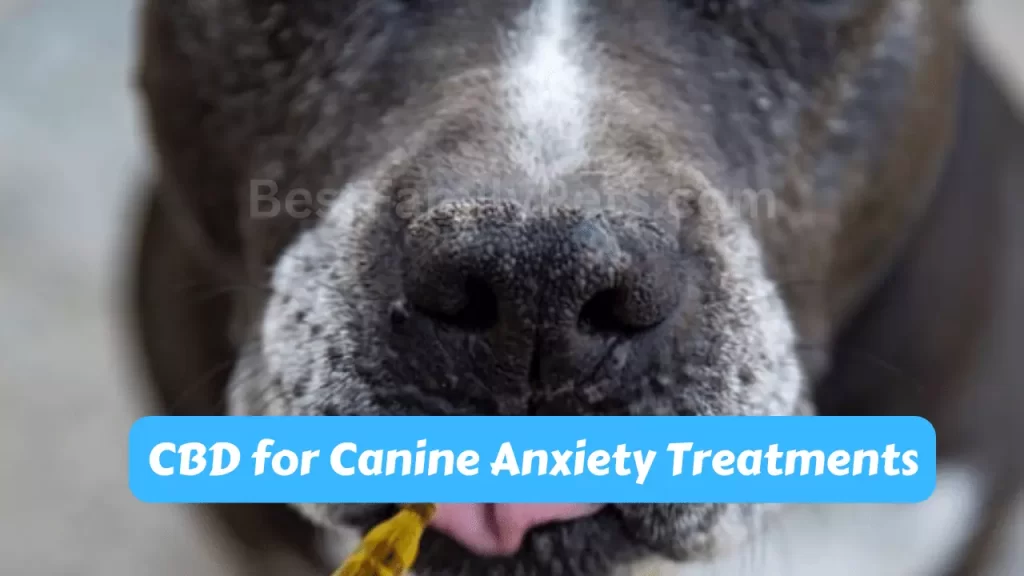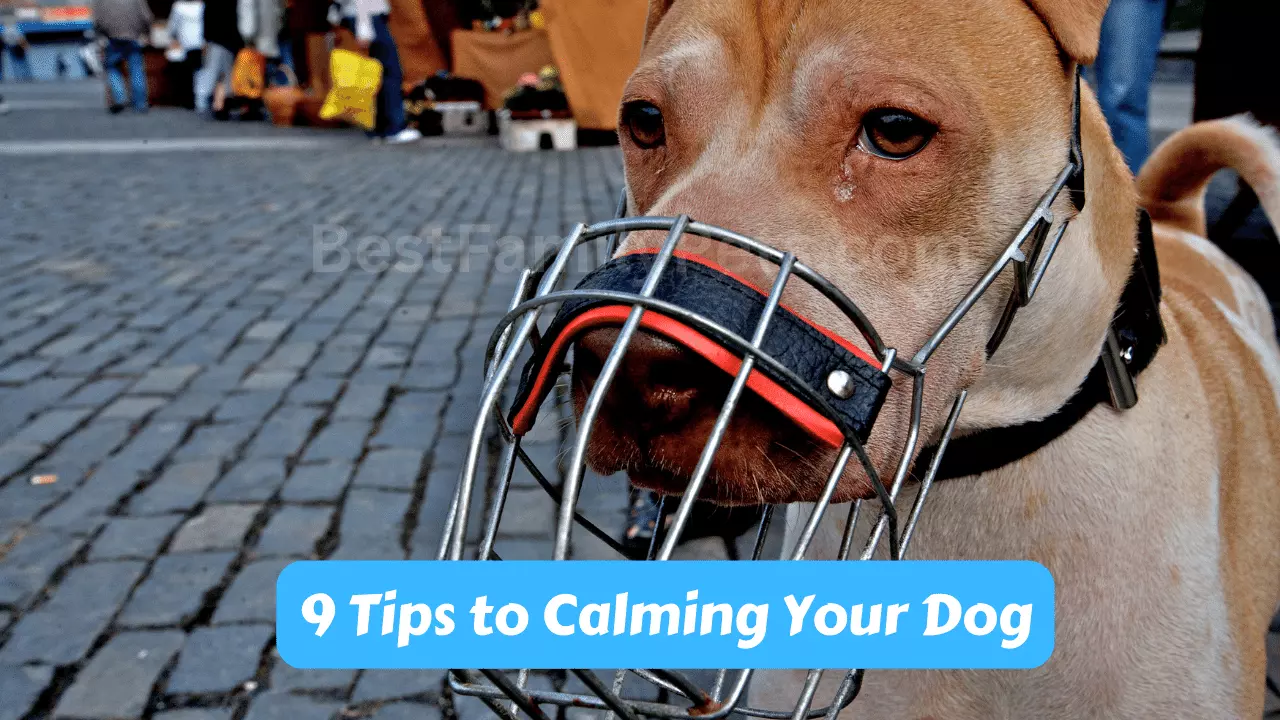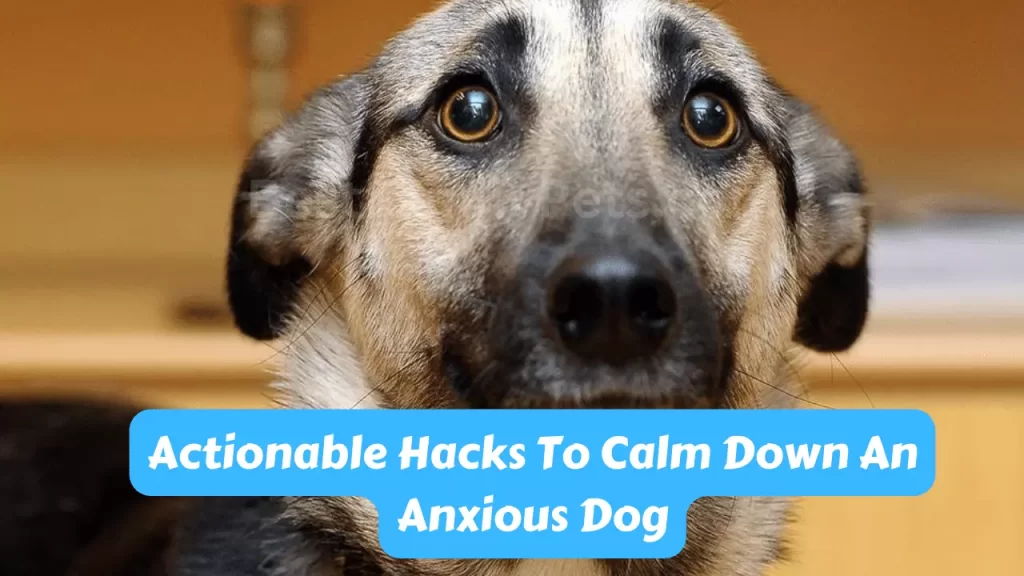9 Tips to Calming Your Dog
Whether your dog is worked up because of something in their environment, their breed or personality, you need to calm your dog for your sanity and theirs.
Left untreated, anxiety can cause health issues and disturbances in your life.
Behavior problems decrease your dog’s quality of life by making them more vulnerable to diseases reducing its lifespan. However, you can manage anxious pups with simple tips like changing their pet food, showing affection and even playing classical music.
What are the Signs of Anxiety?
Body language is the main form of communication for dogs. Some anxiety symptoms are easy to understand, like trembling, pacing, hypervigilance, shaking and decreased appetite.
However, other symptoms may be more challenging to pinpoint. If you are concerned your dog experiences anxiety, you should also look for dilated pupils, skin lesions from self-harm, over-grooming, increased drooling, excessive barking and aggression.
Causes of Anxiety in Dogs
Dogs can feel anxiety for similar reasons to humans, including loneliness, unfamiliarity and overstimulation. Some common causes of canine anxiety include:
Separation Anxiety
While almost all dogs miss their families when they are alone, some dogs experience separation anxiety that leaves them overly anxious and often destructive. Escape attempts, accidental self-harm and destruction of their surroundings are typical results.
Loud Noises
Fear of loud noises like thunder or fireworks is one of the most common anxieties in dogs. Dogs usually hide, become agitated or even aggressive when exposed to excessively loud or sudden noises.
New Locations or Situations
New environments, people and situations are common causes of anxiety in dogs. Some common sources of anxiety include going to new dog parks, moving home or staying at a new kennel.
Genetic Predisposition
While environmental factors can affect a dog’s anxiety or stress levels, a genetic predisposition will also affect a dog’s likelihood to feel stress.
9 Ways to Calm Your Anxious Dog
If you have a dog with anxiety, you want to improve its quality of life and help ease the stress from caring for an overactive or nervous dog. Some simple and effective ways to calm an anxious dog include:
Try Aromatherapy
Essential oils like lavender or chamomile have calming effects for dogs and humans. You can also try synthetic pheromones that may help with anxiety. These calming pheromones imitate dog-appeasing pheromones released by lactating dogs after their puppies are weaned. They help to reassure your dog that it’s safe by mimicking the pheromones of its mother.
Try Playing Classical Music
Studies show that classical music has a calming effect, even on dogs. Playing music can be an excellent option for dogs with separation anxiety who need to be left at home alone as it encourages dogs to lie down and settle more quickly. White noise is also an excellent option for blocking out loud, sudden noises.
Look for a speaker with smart connectivity which allows you to control the volume and music from your smartphone. This will let you manage your dog’s anxiety even when you are away from home.
Show Physical Affection
Genetically, dogs are pack animals. Because domesticated dogs no longer live in packs, you and your family are now their pack. So physical touch like pets, hugs and cuddles help to ease anxiety and alleviate stress.
Change Dog Food
Not all pet food is made equal. Different ingredients and various processing techniques make it hard to know what is in your dog’s food. A low-grade food or one that doesn’t agree with your dog’s body may negatively affect your dog, causing digestive distress or allergies, which can trigger their anxiety. Trying a new food, like healthy high protein dog food made with human-grade ingredients, can provide the nutritional support your dog needs to lower anxiety.
Try a Calming Vest
If you aren’t at home to provide your pup with physical touch, a calming vest can help in a similar way that swaddling calms a baby. By applying pressure to the torso, simulating a hug, calming endorphins are released in your dog’s body, promoting a sense of well-being.
Create a Comfortable Hiding Spot
If your dog’s anxiety is caused by a specific event like fireworks or thunder, the best thing you can do is provide a safe place for them to ride it out. Choose a place they most often hide or take them to a safe place they will like, like a closet or cozy basement. Provide blankets and their favorite toys to make them comfortable.
Avoid Eye Contact
Hyper or overactive dogs are often unaware that their behavior is destructive or distracting. By looking at your dog, you give them attention and validate their behavior. By ignoring them until they’ve calmed down (and then giving them a treat), they learn that their behavior isn’t going to get them their desired results: your love and affection.
Try Calming Supplements
Melatonin, pet-friendly CBD oils, chamomile or dog probiotics can help to calm your dog by lowering its heart rate and helping release positive hormones. Visit your vet for over-the-counter supplement recommendations.
Consider Anxiety Medication
You must talk to your veterinarian if your dog suffers from severe anxiety or cannot calm down with behavioral management techniques. Left untreated, stress can cause serious harm to your dog or those around him.
How to Raise a Calm Dog
If you’re getting a new puppy or have a young dog, it’s time to start training your dog to grow into a calm adult.
Provide Socialization
Exposing puppies to social situations with other dogs and new people can help them avoid anxiety at an early age. If you adopt a dog at an older age who has trauma or pre-existing phobias, a canine behaviorist can help resocialize your dog.
Provide Enough Exercise Opportunities
Studies have shown that dogs participating in regular activity are less fearful and anxious. The destructive behaviors at home, such as jumping, chewing or biting, usually stem from pent-up energy that needs to be expended in a more productive way. Going on walks or playing fetch in the yard can help to keep stress levels down.
Work With a Specialist
By providing training sessions that have positive reinforcement training techniques, you can help set your puppy on the right path toward an anxiety-free life.
Caring for Your Anxious Dog
Knowing what to do with your anxious or overactive dog can be challenging as a pet parent. Luckily, there are many options to prevent your dog from becoming overactive or anxious or helping calm your stressed pet. Helping calm your pet can provide you both with a better quality of life.
Actionable Hacks To Calm Down An Anxious Dog
If you own a dog, dealing with anxious behavior would be a part of life for you. Canines experience anxiety due to different reasons, from thunderstorms to firecrackers and traffic noise.
You can expect it to get stressed while traveling or even on separation from you or a family member. As an owner, you are responsible for keeping the pet calm and happy.
It is essential to understand the underlying cause of canine anxiety and work on it. Here are some actionable hacks you can rely on for calming down an anxious dog.
CBD For Canine Anxiety Treatments

Different treatments will have different effects on dogs with different symptoms and types of anxiety. However, the most common ones include a combination of behavioral therapy, environmental modification, or medications.
Behavioral therapy is a possible treatment for phobia anxiety of loud noises. It involves teaching the dog new habits to eliminate the fear of noise. Moreover, environmental modifications may also reduce the stress felt by pets by minimizing the length of time that the pet is left alone, providing exciting and interactive toys, ensuring a comfortable, safe space, and refraining from using punishments.
However, these treatments alone may not suffice for dogs with severe anxiety. In this case, sedatives, anxiolytics, and antidepressants are prescribed.



